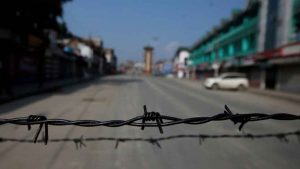 NewDelhi: The Supreme Court on Friday (January 10) said that the indefinite shutdown of internet and restrictions imposed in Jammu and Kashmir was unwarranted, thus rebuking the government for the communication lockdown in the region since August last year. The court said that the indefinite suspension of internet violated India’s telecom rules and ordered the J&K administration to review all curbs in a week’s time.
NewDelhi: The Supreme Court on Friday (January 10) said that the indefinite shutdown of internet and restrictions imposed in Jammu and Kashmir was unwarranted, thus rebuking the government for the communication lockdown in the region since August last year. The court said that the indefinite suspension of internet violated India’s telecom rules and ordered the J&K administration to review all curbs in a week’s time.
Below are some of the key highlights from Justice NV Ramana’s ruling as he delivered the verdict on J&K restrictions today:
- The court will not delve into the political intent behind the orders. Liberty and security are always at loggerheads. It is the court’s job to ensure that the citizens are provided all rights and security.
- Kashmir has seen a lot of violence and that it will try to maintain a balance between human rights and freedoms with the issue of security.
- It is no doubt that freedom of speech is an essential tool in a democratic setup. The freedom of internet access is a fundamental right under Article 19(1)(a) of the Constitution.
- Suspension of free movement, Internet and basic freedoms cannot be an arbitrary exercise of power. Mere expression of dissent or disagreement against a government decision cannot be the reason for internet suspension. Suspending internet should be reviewed forthwith. Such suspension can only be for a limited time period and is subject to judicial review.
- Freedom of speech and expression includes the right to internet within Article 19. The administration must consider restoring government websites and e-facilities where internet abuse is minimal. A complete ban on the internet must be considered by the state only as an extraordinary measure
- The test of proportionality needs to be satisfied in such restrictions. This freedom can only be restricted after relevant factors are considered and only if there are no other options.
- All restrictive orders in Jammu and Kashmir over the past five months following the scrapping of Article 370 are to be made public so they can be challenged legally in Jammu and Kashmir High Court and Supreme Court.
- Disagreement does not justify destabilization. The power under Section 144 of CrPC cannot be used as a curb on the legitimate expression of democratic rights. The freedom of the press is a part of right under 19(1)(a) and is required in every modern democracy.
- Magistrates, while passing prohibitory orders, should apply mind and follow doctrine of proportionality.
- It (Section 144) can’t be used as a tool to oppress difference of opinion.
Bureau Report
Leave a Reply